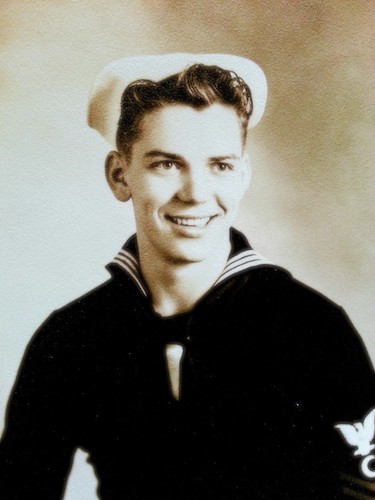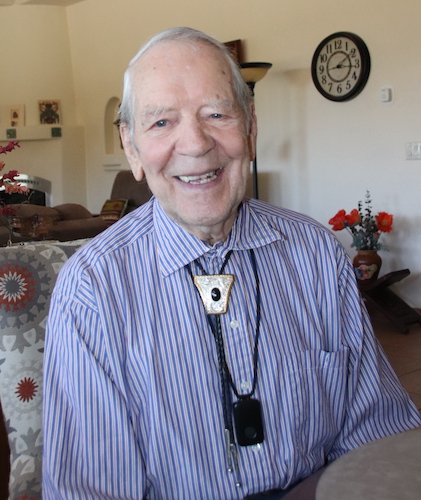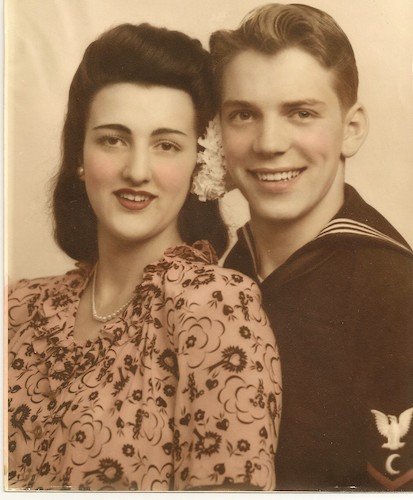 William Glenn Von Hoff when he served in World War II
William Glenn Von Hoff when he served in World War II William Glenn Von Hoff, three days after his 98th birthdayBy Mary Alice Murphy
William Glenn Von Hoff, three days after his 98th birthdayBy Mary Alice Murphy
[Editor's Note: Although this author didn't get to interview him on his birthday, she interviewed him a few days later. The veteran's son, Allan, called from Tennessee to let the Beat know about his father turning 98. He got the phone number from the Silver City clerk. Thank you, Alfred Sedillo.]
William Glenn Von Hoff is a recent resident of Silver City who celebrated his birthday on March 19.
"I was 17 years old when I dropped out of high school in Batavia, Illinois to volunteer in 1943," Von Hoff said. "I got my parent's permission. I wanted to follow in my brother George's footsteps into the Navy where he served on the USS Lexington [and lived through the sinking of the ship]."
Von Hoff did his basic training at Great Lakes (Recruitment Training Command,) Illinois. He said he really wanted to go out on a ship but that wasn't what the Navy planned for him. His first posting was to Pacific Beach, Washington, from the receiving station in Bremerton, WA. He served as a baker for his entire four-year stint.
The base was a small base and served as an anti-aircraft gunnery training facility. He said a plane would fly over pulling a large sleeve behind it, as the target for practicing. Sailors would come to train usually for a week to 10 days at a time. Many came from combat and off ships and were taking refresher courses. As many as 800 to 1,000 would come in. "When they were on base, I made a lot more cookies. I had great big ovens with three shelves. I would have them all full of cookies. One of my other duties in Washington was driving 'the Liberty,' a bus they called 'the Goat,' where I would take them all over town."
 Lee and William Glenn Von Hoff on their wedding day, January 1945While Von Hoff was in Washington state, he met his wife, Clarabelle Lee Coffey. Pacific Beach, WA, was a small town, with not much more than a post office and a roller rink in addition to the Navy base. He said his wife never wanted to be called by her full name, but preferred Lee, or "Dimp" a nickname given her by a high school girl friend. Lee would have been embarrassed to see her full name in an article. She died in 2020 after their 77 years of marriage.
Lee and William Glenn Von Hoff on their wedding day, January 1945While Von Hoff was in Washington state, he met his wife, Clarabelle Lee Coffey. Pacific Beach, WA, was a small town, with not much more than a post office and a roller rink in addition to the Navy base. He said his wife never wanted to be called by her full name, but preferred Lee, or "Dimp" a nickname given her by a high school girl friend. Lee would have been embarrassed to see her full name in an article. She died in 2020 after their 77 years of marriage.
"I met her at the roller rink in 1943," Von Hoff said. "She was there with a girlfriend and was bored." She, as the story goes, told her girlfriend "I'm going home unless you introduce me to that cute sailor that just walked through the door."
She lived about 2.5 miles out of town and had four brothers. "Every night after work, I would walk those miles to her house to see her. I was restricted to base, but because I was a baker, the guards would let me and the cooks go AWOL, if we were back by 10 p.m. I gave up driving the Liberty bus for a far better cause!"
When he was still trying to impress her mother, he offered to do the dishes. "…So she knew I was willing to work."
"I went to sweet talk my girlfriend one night," he said. "She lived in a two-story house with her family, and I threw rocks at her window. She opened the window, and we were talking. Her father heard her talking from downstairs and asked who she was talking to. She replied: 'Oh, just the man in the moon.' Her dad came outside, walked around the house and there I was. He said: 'It's the first time I've ever seen the man in the moon in dungarees!' But he didn't report me, although he was my superior officer at the base. I guess he liked my desserts."
His father-in-law had married his mother-in-law when he was 29 and she was 43 with five kids.
Von Hoff was the sole baker on his shift and would bake 130 pies once or twice a week, and every Wednesday he would bake 1,500 cookies, many times oatmeal cookies with raisins. "I was the only baker, but there were five or six cooks. Once a week, an officer would come to inspect to see if the kitchen was clean. I had one corner of the kitchen with huge stoves. I would squeeze a case and a half of fresh lemons for the lemon meringue pies but had lemon powder if needed. I always had left-over lemon powder so I would sprinkle it on the floor and wash the floor. It made my corner of the kitchen floor white and shiny, and the rest was just gray concrete. I got in trouble with the cooks."
At one point, he got an excellent assistant, a Black fellow, he said. "Some of the officers also had Black helpers, and one time my assistant got in a fight with another Black helper who stabbed him. He walked to the medic clinic, but he died from the stabbing. I lost my assistant and never got another."
Von Hoff noted that the cooks and bakers belonged to the same division as those who sent out the payments. "We kind of blackmailed the paymasters and said: 'If you don't do what we want, you might not get to have leave to go to town to see the girls.'"
He said the officers were always friendly to the enlisted men and respected them. "I was particularly proud, because unlike many of the others, who were drafted, I volunteered," Von Hoff said.
Von Hoff's second and final posting for his military service was in Pacific Beach, California, near San Diego. The cooks and the baker fed the guys stationed at Pacific Beach, CA, "all homemade cooking."
"Those were happy days, when citizens were patriotic," Von Hoff said. "If a family lost a member to the war, they would put out a flag and maybe a candle in the window to honor them."
He also said it was safe to hitchhike, too. "If you were in uniform and stood on the side of the road, within just a few minutes someone would pick you up and take you where you wanted to go."
"One of my greatest regrets is that I didn't get the addresses of those I served with, so I could keep up with them," Von Hoff said. "One I still remember was John Good of Colorado Springs, CO. Even in the military, you needed a good friend."
He said he also had negative news about his service. "I wasn't a Christian. Most sailors didn't have much money, but I had always worked since I was a young teenager, so I saved my money. That's why I walked to see my girlfriend. I even loaned money to someone if they needed it. I trusted them to pay me back next payday, and they always did. Because I wasn't a Christian and I thought I was macho, at one point when we lived in California, I went with several others to Tijuana. We got drunk, and the Tijuana police put me in jail in my uniform. It was hard to get out, and it was scary for me, but the base officers got me out."
Von Hoff said he would probably have re-enlisted, but by then he had a wife (married in January 1945) and was discharged in 1947. He moved back to Batavia, Il. and by 1948, he and his wife had three boys, a 1-year-old, a 2-year-old and a 3-year-old.
He said he found it difficult, and it took days and weeks to be a civilian and make his own choices and decisions after this stint in the military.
He said he became a Christian when they lived in Batavia while he worked in Elgin, Illinois where he was an electrical lineman. He and his wife, with their boys, attended LIFE Bible College in Los Angeles, and after pastoring in Vincennes, IN and Joliet, IL they became missionaries in Ecuador and Chile, subsequently managing orphanages in Honduras and Baja California.
The veteran said he moved to Albuquerque, NM, in 1978 for a job. When William Glenn Von Hoff was 93, his wife passed away and in 2022 he moved in with Steve and his wife, Beverly. The three all moved down to Silver City in 2023.










